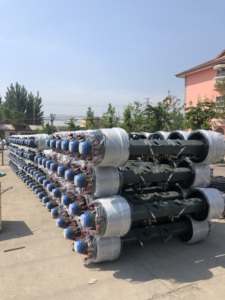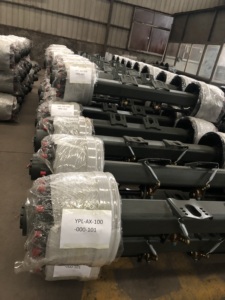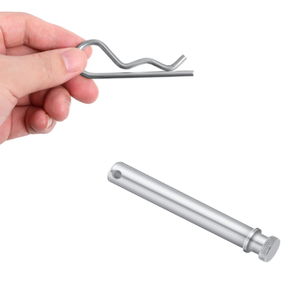(170673 products available)























































































































































































































Trailer axles are mechanical systems that connect two wheels beneath a trailer. They serve as the foundation for the trailer's wheel system, supporting its weight and enabling movement. The type of trailer axle fitted on a trailer is crucial as it impacts the trailer's performance, handling, and overall functionality. There are different types of trailer axles, each suitable for specific purposes.
Utility trailer axles
Typically, utility trailers have axle ratings of 3500 lbs. 5200 lbs. 6000 lbs. and 7000 lbs. The 3500 lbs. axles are the most common. They are ideal for general use, such as hauling cars, landscaping equipment, or other light to medium loads. The following are the most common types of utility trailer axles.
Torsion Axles
Instead of using traditional springs and a beam under the trailer, torsion axles utilize independent rubber-mounted tubes. These tubes contain the axle shafts and twist when loaded, providing resistance. This design offers several advantages over conventional spring-beam systems. Torsion axles deliver a smoother ride, are more durable with fewer moving parts, and require less maintenance. They also provide independent wheel adjustment.
Leaf Spring Axles
Leaf Spring Axles employ a traditional design consisting of metal springs shaped like leaves. These spring leaves are stacked on top of each other and pivot on a center bolt. When weight is applied, the leaves flex apart, allowing the trailer to carry loads. Leaf Spring Axles are less expensive than torsion axles. They also provide a simple and proven suspension system. However, they offer a rougher ride, require more maintenance, and have limited adjustability.
Electric Braked Axles
Electric braked axles improve safety when towing utility trailers. They use electric brakes synchronized with the towing vehicle's braking system. When the driver applies the brakes, the trailer's electric brakes engage, providing additional stopping power and better control. Electric braked axles are especially beneficial for larger trailers or those carrying heavy loads.
Boat trailer axles
Boat trailer axles are designed specifically for trailers that transport boats. One key feature of boat trailer axles is their corrosion-resistant properties. They are often constructed using galvanized steel or aluminum. These materials offer increased strength and durability while minimizing rust and deterioration from exposure to water. Additionally, boat trailer axles feature sealed bearings and waterproof components. These features prevent moisture and contaminants from entering critical moving parts, thereby enhancing reliability and longevity.
Horse trailer axles
Horse trailers transport horses. Therefore, horse trailer axles are engineered to accommodate the weight and ensure the well-being of the animals during transit. They often have higher load ratings than other trailer types. Horse trailer axles focus on smooth and quiet operation to avoid disturbing the horses. They may also incorporate features such as suspension systems tuned for comfort and safety.
Some of the specifications of the trailer axle include:
Maintaining trailer axles is important because it helps to increase their lifespan and also enhances their optimal performance. Here are some tips for maintaining trailer axles:
Choosing the right trailer axle can be a daunting task, especially when there are numerous options to consider. However, it is important to note that the trailer axle is the foundation of the trailer's reliability and durability. It is also essential to choose the right trailer axle for optimal trailer performance. Below are some factors to consider when choosing a trailer axle:
Carrying capacity: Every trailer axle has a load capacity. This capacity tells users the weight they can carry without damaging the axle. When choosing a trailer axle, ensure to look for one with a higher load capacity than the weight of the load to be carried. This ensures that the axle performs optimally without stress.
Type of axle: Trailer axles come in different types, each suitable for a specific purpose. Choosing the right type of axle for the trailer is important. Consider the purpose of the trailer, whether it is for commercial use or personal use, before selecting an axle type. The different types of trailer axles are discussed in the earlier part of this text.
Trailer axle size: Trailer axles come in different sizes. The size of a trailer axle is determined by its diameter. When choosing a trailer axle, consider one with a larger diameter. This is because larger-diameter axles offer more strength and durability than smaller-diameter axles.
Budget: Trailer axles are available at different price points. When choosing an axle for a trailer, ensure to consider one that is within the budget but also offers quality.
Ultimately, when choosing a trailer axle, pay attention to the important factors that ensure the trailer axle's optimal performance and longevity.
It is advisable to have a professional mechanic handle trailer axle replacements. However, it is possible to do it as a DIY project with the right tools and knowledge. The first step of any DIY project is to gather information. Consult the user manual for the trailer to be worked on. The manual should give information on the axle size to purchase. Different trailers have different axle sizes.
Once the correct axle has been purchased, gather the tools needed for the job. A mechanic's toolset will have all the required tools. Jack stands and a jack will be needed to lift the trailer off the ground. Wheel chocks will be needed to keep the trailer in place and prevent it from moving. Wheel wedges will keep the trailer in place. A torque wrench may be needed when tightening bolts. Safety glasses should be worn to protect the eyes from falling debris. Gloves and work clothes will keep the mechanic clean.
The replacement process:
It is recommended to consult a professional after replacing the axle. A mechanic can test the trailer axle to ensure it is properly aligned and working.
Q1: What are trailer axles?
A1: Axles are an important part of trailers and are important for supporting weight and providing balance. The trailer axle also makes it possible for the trailer to be towed. Without the axle, the trailer would not be able to roll. However, there are different kinds of axles, and each trailer can have its own unique kind of axle depending on the size and weight of the trailer.
Q2: Which trailer axles are the best?
A2: There is no one trailer axle that is right for every trailer. However, some options are popular among people because they are reliable and effective. For example, the Dexter axle is a well-known option for people looking for a maintenance-free experience. The axle features a unique design that requires no regular maintenance. Another option is the Lippert axle, which is a popular choice for caravan and camper trailers. Finally, Al-Ko trailer axles are durable and made with high-quality materials.
Q3: Can trailer axle upgrades be done?
A3: Yes, it is possible to upgrade trailer axles. Upgrading the axle can improve towing capacity and increase the trailer's longevity. However, it is important to choose an axle that is compatible with the trailer.
Q4: How do you know if a trailer axle is bad?
A4: Some common signs of a bad trailer axle include trailer vibration, uneven tire wear, and difficulty towing the trailer. If the trailer axle is damaged, it will be difficult to tow the trailer.
Q5: Can trailer axle problems be fixed?
A5: Yes, there are solutions to trailer axle problems. However, depending on the severity of the damage, it may be more effective to replace the axle rather than repair it.